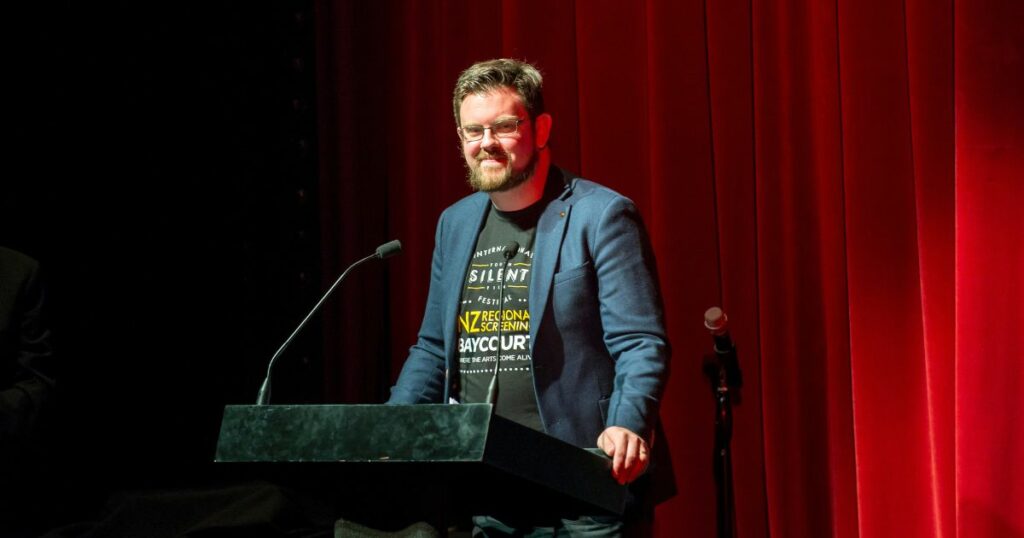James Wilson has recently joined the Funding HQ team as a Fundraising Coach, focused on the arts, culture and heritage sectors. His extensive experience in the area combined with his passion for the public funding of the arts make him the perfect addition to our growing team. Get to know more about James in the Q&A below.
- What is your background and how did you start working with fundraising?
I’ve worked in the arts and culture sector for twenty years now and have been incredibly lucky to work for some inspiring organisations, both in Aotearoa, and in the U.K, where I grew up. I trained as a theatre director at Rose Bruford drama school, in London, and although I didn’t quite realise it at the time, there are lots of parallels between fundraising and the rehearsal room. Both spaces are about creating a compelling narrative: working to bring together people around a powerful vision or idea and communicating that clearly and urgently. As a director, you are searching for what the motivation is behind the lines that a character speaks, and in fundraising, understanding motivation is also key: What are the motivations of a funder or a donor that make them want to support your cause? How do you structure your ‘ask’ so that you can clearly demonstrate how your work delivers to the motivations of the funder?
I’m a passionate advocate for public funding of the arts. I think that arts, culture and creativity are essential services for our communities, and I believe that everyone should have access to arts experiences. There is always lots of demand on funding sources, that’s something that remains consistent no matter what else is happening around us, and so it’s critically important to keep making the case for more support for the arts, by talking about the value that our sector creates.
- What are the biggest challenges arts, culture and heritage organisations are facing today?
There is no avoiding the impact that COVID has had on the arts, culture and heritage sector, and so many organisations are very much still in recovery mode. We were the first sector to face restrictions on numbers and the nature of bringing people together for a shared experience meant that we were one of the last sectors to get going again, post lockdowns. This has had an immense impact on revenue for arts organisations- not just in terms of lost ticket sales from cancelled events, but also in getting in the way of the relationships that are so essential to fundraising. Too often ‘unhelpful narratives’ about funding for the arts are what makes it into the media, and this in turn can fuel public perception that as a sector we are all in competition with each other, squabbling over who gets funded and who doesn’t. This really doesn’t help, and I believe that as a sector we need to be taking every possible opportunity to communicate the value that we create, how we make people feel, and the role we play in building strong communities. I believe that the arts are essential community infrastructure, and just like other essential infrastructure, like roads and pipes, the arts requires investment and support.
Our sector is known for making things happen on the smell of an oily rag and for a ‘can do’ attitude, which is great to some extent- but this has contributed to a real undervaluing of artists and practitioners, where those creating projects are often working for free. This has to change, and I believe that there is an urgent need for us to be honest about what it costs to make art. How are we going to convince others to grow their support for the arts, if we continue to operate from a place of scarcity? The solution has to involve paying people properly and building sustainable careers for those working in our creative sectors.
- How do you think Funding HQ can help these organisations to overcome these challenges?
Fundraising can feel very daunting and isolating, particularly if everyone in the organisation is looking at you to somehow secure the funds needed for a project. I love the way that Funding HQ’s approach wraps support around fundraisers, so that you are not on your own in this work. A key part of this is having access to a coach who you can share challenges and successes with, as it can be hugely helpful to have someone who knows the funding landscape to bounce ideas off.
The funding picture is always shifting, with new funds becoming available, and funding priorities changing and evolving over time. Keeping on top of this is no easy task, and I love the way that Funding HQ brings all of this knowledge into a central place for our members, giving organisations a clear picture of what funds might be available to them.
Successful fundraising requires confidence and momentum, and Funding HQ plays a key role in supporting our members to succeed. I remember a conversation many years ago about needing to get better at ‘exercising the ask muscle’- this is the idea that to raise funds, you need to get comfortable asking for support, which is not the easiest thing to do. I love the way that Funding HQ helps clients to get confident and clear about their fundraising ‘ask’, meaning that you are far more likely to succeed when you do ask for support.
- What is the role of performing arts in our society and why do you think it is important to make it accessible to everyone?
Art, Culture and Creativity is essential to what it means to be human- it’s the stories we tell about ourselves, it’s how we connect to our past, and it’s how we dream about the future. Investing in arts and culture means that we invest in people and communities, giving people a platform to explore and share their stories, and doing this through bringing people together, through shared experiences. We are all born creative- with a sense of curiosity and a hunger to learn. I believe that it’s vital that we find ways to enable and foster this creative spirit, so that people don’t lose sense of this very human skill of creativity. Making art accessible to everyone, giving everyone the opportunity to express themselves, whether that is through participation or through attending arts events, helps to build stronger, vibrant, more connected communities.
- As a passionate arts advocate, what is your favourite play/musical/performing arts format and why?
My background is as a theatre maker, and whilst I’ve been lucky to work across a wide range of artforms and genre, it is theatre that still has a direct line to my heart. There is nothing better than live performance. I love the idea that theatre is so ephemeral- you have to be there, at that specific moment in time, in the same room as everyone else, experiencing a story together as an audience in a way that is never to be repeated. I love ensemble performance work- there is nothing more powerful than a group of artists working together on stage, sharing connection and energy. That connection is electric, and when you feel it as an audience member, there is nothing quite like it.
Are you responsible for fundraising in your organisation? Don’t forget to touch base with our team to see how a Funding HQ membership would benefit you.

